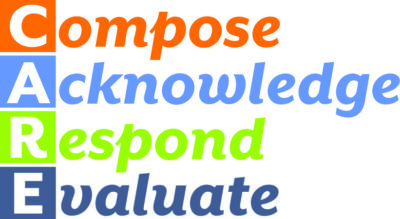CAREmunication®
Better communication is essential to improve both teamwork and patient experience
At the heart of Stamp & Chase’s integrated approach to communication improvement for frontline managers and staff is our core experience curriculum, CAREmunication®. This evidence-based model uses time-tested best practices in interpersonal communication improvement and applies them to the unique challenges in patient experience, patient safety, and teamwork.

Using a train-the-trainer approach, communication improvement workshops are facilitated by colleagues to increase acceptance and buy-in. Facilitator Training provides in-house program leaders with everything they need to be successful, including detailed, easy-to-follow Facilitator Guides and comprehensive presentation materials. Facilitators continue to be supported with individualized advice and coaching from Stamp & Chase advisers.
Physician Communication and Teamwork
In collaboration with physician leadership, Stamp & Chase approaches communication improvement among physician audiences in a measured, thoughtful, respectful way. Initial project stages are focused on building trust among key constituencies – both physicians and other professionals among the care team – and understanding how and where current communication practices support and impede optimal performance.
Because of their pivotal role on the health care team, physicians’ behaviors have a profound impact on how a team functions and on their ultimate results. Communication practices and the significant role they play in the high functioning of a team cannot be neglected if organizations aspire to achieve superior results and deliver care in the safest environment possible.

Core Curriculum Learning Objectives
Module 1 – Communication: At the Heart of Compassionate Care
- Explain the benefits of improved communication for self, patients and their team.
- Describe the C.A.R.E. model and apply the principles to improve communication in professional and personal situations.
- Explain the importance of active listening in facilitating good communication in a variety of situations.
- Use techniques to achieve a “composed” state in which communication can occur most effectively.
Module 2 – Your Personal Communication Improvement Plan
- Identify specific, individual improvement goals using the online communication self-assessment as a guide.
- Develop strategies to achieve personal communication improvement goals.
Module 3 – Ensuring Accuracy & Understanding in Communication
- Effectively use “acknowledge” techniques to ensure understanding in any communication situation.
- Apply active listening techniques to enhance understanding and accuracy in patient care communication situations.
- Anticipate circumstances where patient care communication has the potential to breakdown and develop strategies to improve accuracy.
Module 4 – Recognizing & Overcoming Communication Roadblocks
- Recognize and anticipate barriers to effective communication.
- Articulate and apply techniques to overcome communication barriers in a variety of situations.
Module 5 – Building Rapport & Trust
- Explain the personal and organizational advantages of building short- and long-term rapport with patients, family members and colleagues.
- Utilize specific techniques to enhance trust, thus improving communication.
Module 6 – Effective Written Communication
- Use techniques to make written documentation more succinct, clear, effective and understandable for all member of the care team.
- Write and respond to email messages effectively, including knowing when to communicate in person rather than electronically.
- Apply tips to write more clearly and effectively in all situations to enhance readability and understanding.
Module 7 – Making Difficult Conversations Easier
- Explain an overall framework for approaching any difficult conversation more confidently.
- Apply specific techniques to make difficult conversations easier and more successful.
- Describe the most effective approach to handling patient concerns and complaints using the C.A.L.M. model.
Module 8 – Living the CAREmunication Principles
- Describe specific behaviors and situations which will be a focus in achieving goals in their Personal Communication Improvement Plan.
- Describe commitment to improving communication effectiveness in their personal and professional lives.
